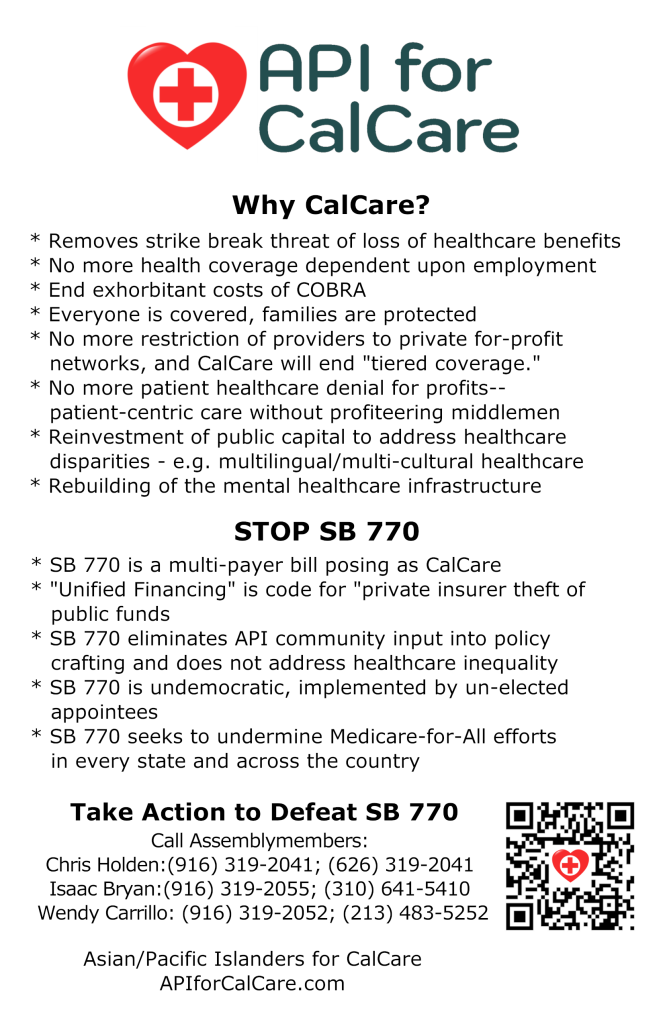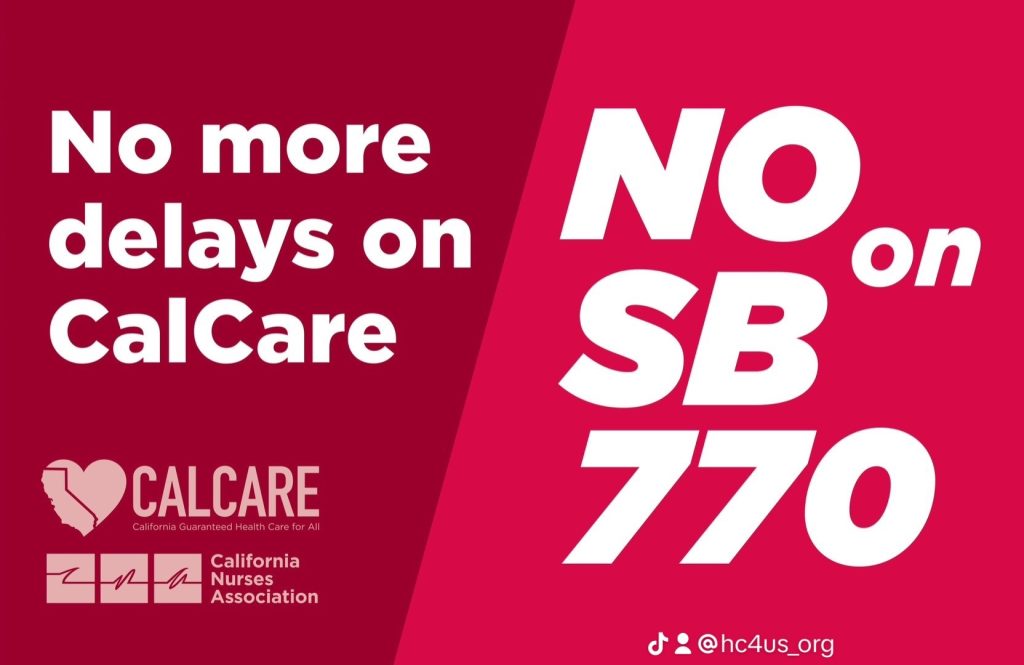5 Reasons to Oppose SB 770
1. SB 770 and CalCare are mutually exclusive and SB 770 is designed to delay and derail Single-Payer reform efforts
While their double-speak seeks to mislead many to think otherwise, the fact is that forces behind SB 770 include those that did NOT SUPPORT the last incarnation of CA Single Payer reform, AB 1400 which sought to close the for-profit loopholes that prevent us from moving towards a patient-centered healthcare system in the interests of corporate profit and control of the public financing pipeline. Note also, that while AB 1400 was the first major healthcare reform bill which sought to address healthcare disparities faced by Asian/Pacific Islanders and other communities facing similar systemic discrimination by the current system, these same forces supporting SB 770 generally fail to give anything more than the most superficial attention to such matters.
CalCare would establish a single-payer system in California that eliminates middlemen between patients and doctors. SB 770’s goal is to open loopholes to keep for-profit middlemen in the public financing pipeline. If passed, SB 770 creates an un-elected “working group” to have “conversations” that would kill CalCare for this session and beyond.
2. Enough delay, it’s time to act:
This proposed working group could delay action on CalCare as late as 2028. The millions of Californians without insurance can’t wait. Our communities will continue to suffer the impact of ongoing healthcare inequality and systemic racism due to the profit-motives of private insurance companies and other corporate greed that dictates healthcare services delivery.
3. We need our elected leaders to show courage, and fight for the needs of the people, NOW:
SB 770 gives legislators a ready-made excuse to not take action on CalCare,
especially if the working group recommends half-measures in lieu of single payer.
SB 770 is a cynical effort to kick the can down the road and quell any legislative motion aiming to deliver true patient-centric healthcare.
4. We don’t need any more studies:
The Governor’s Healthy California for All Commission already had these conversations and even spent millions on an external legal brief on the subject. SB 770 will waste resources on redundant efforts to pull attention and energies from addressing the actual healthcare problems our communities face and continue to deny us input as to what are actual pressing healthcare needs are.
5. Informal discussions are futile:
This working group would have no real accountability, and nothing from the discussions would be legally binding. The EXISTING FEDERAL LAW is clear: Policy legislation like CalCare is required first, and then the process on waivers can take place.
Testimony in Opposition to SB 770
See more analysis of SB 770:
https://apiforcalcare.com/analysis-of-sb-770-a-multi-payer-bill/
Link to a PDF of the above analysis: Yes-on-CalCare-Means-No-on-SB770.pdf
How SB 770 is a NOT a Single-Payer reform legislation:
“Unified Financing” is a Trojan horse catch-phrase for continued profit-motivated, corporate control of the healthcare system in opposition to true, patient-centric healthcare where medical professionals’ expertise is allowed to dictate proper addressing of our medical needs. Read more here:
Understanding the Language of SB 770
API for CalCare Letters in Opposition to SB 770:
Letter to Assembly Committee on Health
Letter to Assembly Committee on Appropriations
API for CalCare Letters in Opposition to SB 770:
There is a lot of misinformation being peddled to create an illusion that SB 770 advances the cause of Single Payer healthcare. Not only are supporters of SB 770 flat-out lying about about “waivers” they are purposefully denying the reality of existing federal law. Read more HERE.
API for CalCare Half-sheet Flyer:

For a printable 2-half-sheets/page version of the above graphic, click HERE.
